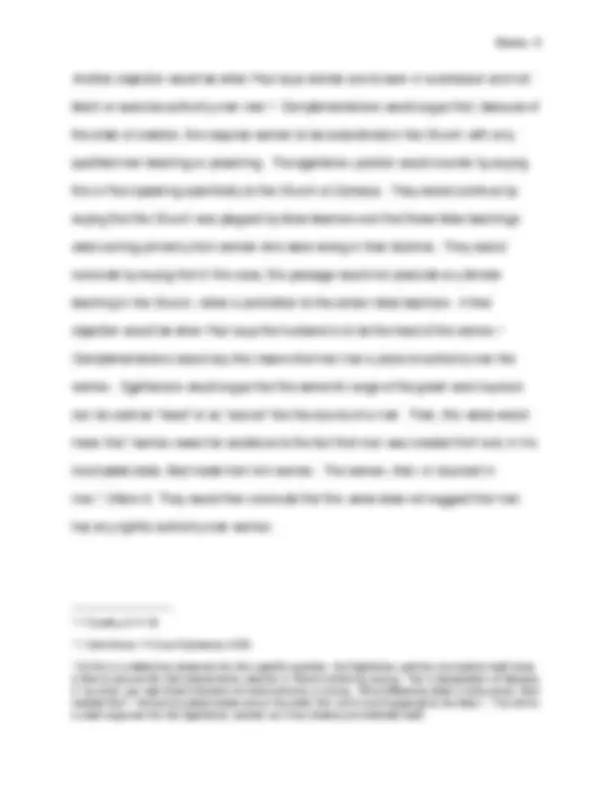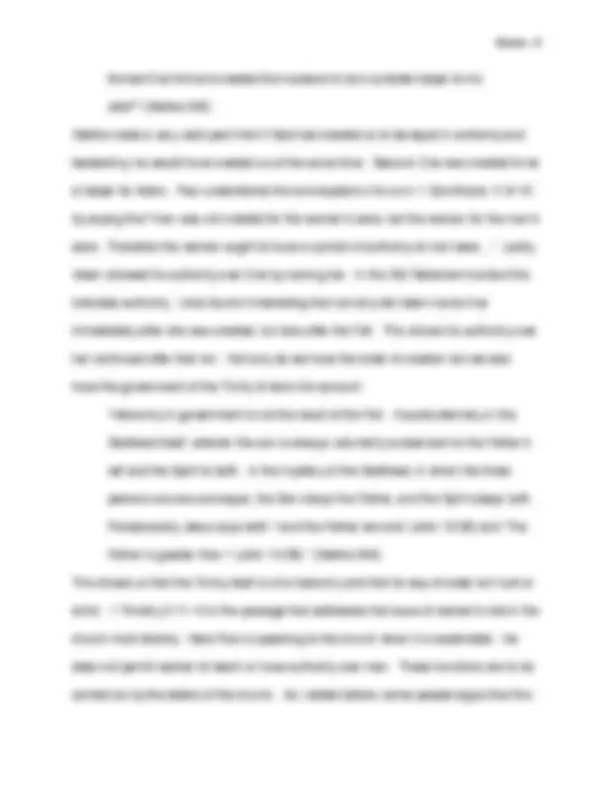








Study with the several resources on Docsity

Earn points by helping other students or get them with a premium plan


Prepare for your exams
Study with the several resources on Docsity

Earn points to download
Earn points by helping other students or get them with a premium plan
Community
Ask the community for help and clear up your study doubts
Discover the best universities in your country according to Docsity users
Free resources
Download our free guides on studying techniques, anxiety management strategies, and thesis advice from Docsity tutors
The debate between egalitarianism and complementarianism, two positions on gender roles in the Church. The creation story and its interpretation play a significant role in this discussion. Egalitarians believe in the equal dignity and responsibility of men and women, while complementarians see a distinction in role. objections and counter-objections to both positions.
What you will learn
Typology: Lecture notes
1 / 11

This page cannot be seen from the preview
Don't miss anything!







! How does gender play a role in the Church today and what does the creation story have to do with it? This is the very question that the church has been trying to answer in the past few decades. Two positions have emerged to answer this question within the Church, and they are complementarianism and egalitarianism. To begin, we will look into where each of these positions stands and how creation and gender roles are seen. We will also analyze some of the theological problems for each side. Lastly, I will explain my opinion on the positions as well as analyze Scripture to see what it says.
! We will begin with the egalitarian position. This position believes the creation story as saying God created man and woman equal in every respect. They say Genesis 1:26-27 makes no distinction between the two, and we are both made in God’s image. They also use Scripture to say that man and woman have equal responsibility in ruling God’s creation. When sin entered the world this defiled the relationship between man and woman and ushered in a hierarchy system. They believe that Genesis 3: shows that due to sin, a desire of subservience to man was instituted. Not only were women affected by this, but because of sin, man also developed a desire to reign over woman. Due to sin, men and women’s relationship is now defiled and we are inclined to live a life of harmful supremacy and submission. Lastly, through Christ, we have been restored to our intended equality. Egalitarians interpret Galatians 3:28 as expressing the truth that Christ abolished this hierarchy and therefore there is no longer a
Church in light of the creation narrative. They use passages such as Ephesians 5:22-23 and 1 Timothy 2:8-15 to show this type of leadership and authority.
! There are quite a few objections to each of the positions. Each one has legitimate arguments, but they potentially contain contradictory statements and weak points. In this section I will take three main objections to each position and provide a response in favor of the position in question. These objections have been adapted from Ware’s article on both positions.^1 ! One objection to the egalitarian view is that they seem to ignore what Paul says in Ephesians about wives submitting to their husbands.^2 The complementarians would ask how Paul can rightly do this if his declared hierarchy is the result of sin and now abolished in Christ. Egalitarians would respond by saying that Ephesians 5:21 begins the requirement by explaining that we are to “be subject to one another in the fear of Christ.” They would claim this to be a contradictory statement to what is said in verses 22 and 23 if interpreted as wives submitting to husbands. Therefore, this would be a prime example of the kind of submission that needs to happen to everyday Christians, regardless of gender. They would claim this example to be illustrative and not literal. (^1) Ware, Bruce. "Summaries of the Egalitarian and Complementarian Positions on the Role of Women in the Home and Christian Ministry." Council on Biblical Manhood and Womanhood. (2011): Print. <http:// www.cbmw.org/images/articles_pdf/ware_bruce/positionsummaries.pdf>. (^2) Ephesians 5:22-23.
Another objection would be when Paul says women are to learn in submission and not teach or exercise authority over men.^3 Complementarians would argue that, because of the order of creation, this requires women to be subordinate in the Church with only qualified men teaching or preaching. The egalitarian position would counter by saying this is Paul speaking specifically to the Church at Ephesus. They would continue by saying that the Church was plagued by false teachers and that these false teachings were coming primarily from women who were wrong in their doctrine. They would conclude by saying that in this case, this passage would not preclude any female teaching in the Church, rather a prohibition to the certain false teachers. A final objection would be when Paul says the husband is to be the head of the woman.^4 Complementarians would say this means that man has a place of authority over the woman. Egalitarians would argue that the semantic range of the greek word kephale can be used as “head” or as “source” like the source of a river. Then, this verse would mean that “woman owes her existence to the fact that man was created first^5 and, in his incomplete state, God made from him woman. The woman, then, is ‘sourced’ in man.” (Ware 4) They would then conclude that this verse does not suggest that man has any rightful authority over woman. (^3) 1 Timothy 2:11- (^4) 1 Corinthians 11:3 and Ephesians 5:23. (^5) As this is a defensive statement for this specific question, the Egalitarian position contradicts itself when it tries to accuse the Complementarian position in Ware’s article by saying, “Your interpretation of Genesis 2, by which you see three indicators of male authority, is wrong. What difference does it make whom God created first? He had to create create one or the other first, and it just happened to be Adam.” This forms a weak argument for the Egalitarian position as it has already contradicted itself.
Adam named the animals, even when he was created after them. This showed his authority over all of them. Lastly, based on the complementarians’ position on how sin effected the relationship between man and woman,^8 the egalitarians would say that Genesis 3:16 says nothing about Eve wanting to rule Adam, but it speaks specifically of Adam wanting to rule Eve. That rather, sin affected Adam in a way to cause a desire to rule over his wife, “despite her longing for equal companionship.” (Ware 10) Complementarians would respond by stating two problems with this theory. First, claiming that Eve desired a positive or caring relationship would neglect the fact that she also was cursed by the Fall. Second, since her desire was negative, then it follows Genesis 4:7 in its view of sin as desiring to usurp rulership. This is supported with an identical sentence structure as well as a parallel terminology between the two passages.
! As I examined the Biblical text as well as both positions, I believe that the Complementarian view is the most aligned with the text. We can see from Genesis 1:26-27 that both man and woman were created in the image of God. Genesis 2 shows us three reasons why man is to rule over woman. First, Adam was created before Eve. ! “Is it not plausible to assume that if God intended equality in government, he ! would have formed Eve and Adam at the same time and made them helpers ! suitable to each other? If he has wanted a matriarchy, would God not have (^8) They believed that because of the Fall, Eve had a desire to rule over Adam.
! formed Eve first and created the husband to be a suitable helper to his ! wife?” (Waltke 242) Waltke made a very valid point that if God had created us to be equal in authority and leadership, he would have created us at the same time. Second, Eve was created to be a helper for Adam. Paul understands this and explains it to us in 1 Corinthians 11:9- by saying that “man was not created for the woman’s sake, but the woman for the man’s sake. Therefore the woman ought to have a symbol of authority on her head....” Lastly, Adam showed his authority over Eve by naming her. In the Old Testament context this indicates authority. I also found it interesting that not only did Adam name Eve immediately after she was created, but also after the Fall. This shows his authority over her continued after their sin. Not only do we have the order of creation but we also have the government of the Trinity to take into account. ! “Hierarchy in government is not the result of the Fall. It exists eternally in the ! Godhead itself, wherein the son is always voluntarily subservient to the Father’s ! will and the Spirit to both. In the mystery of the Godhead, in which the three ! persons are one and equal, the Son obeys the Father, and the Spirit obeys both. ! Paradoxically Jesus says both ‘I and the Father are one’ (John 10:30) and ‘The ! Father is greater than I’ (John 14:28).” (Waltke 243) This shows us that the Trinity itself is of a hierarchy and that its way of order isn’t evil or sinful. 1 Timothy 2:11-14 is the passage that addresses the issue of women’s role in the church most directly. Here Paul is speaking to the church when it is assembled. He does not permit women to teach or have authority over men. These functions are to be carried out by the elders of the church. As I stated before, some people argue that this
reserved for the elders and preachers. We began by seeing what egalitarians and complementarians thought on the roles of gender in the church. We also analyzed some of the weaknesses in the arguments by each side. Lastly, we looked at my opinion on the positions as well as examining the Biblical text. Through this we can see that God has placed man as a ruler over woman, not as a tyrant, but as a loving leader in the home and the Church.
Grudem, Wayne. Biblical Doctrine: Essential Teachings of the Christian Faith. Grand ! Rapids, MI: Zondervan , 1990. Print. Grudem, Wayne. Systematic Theology. 1st. Grand Rapids, MI: Zondervan , 1994. Print. Ware, Bruce. "Summaries of the Egalitarian and Complementarian Positions on the ! Role of Women in the Home and Christian Ministry." Council on Biblical Manhood ! and Womanhood. (2011): Print. <http://www.cbmw.org/images/articles_pdf/ ! ware_bruce/positionsummaries.pdf>. Waltke, Bruce. An Old Testament Theology, an Exegetical, Canonical, and Thematic ! Approach. 1st. Grand Rapids, MI: Zondervan , 2007. Print.